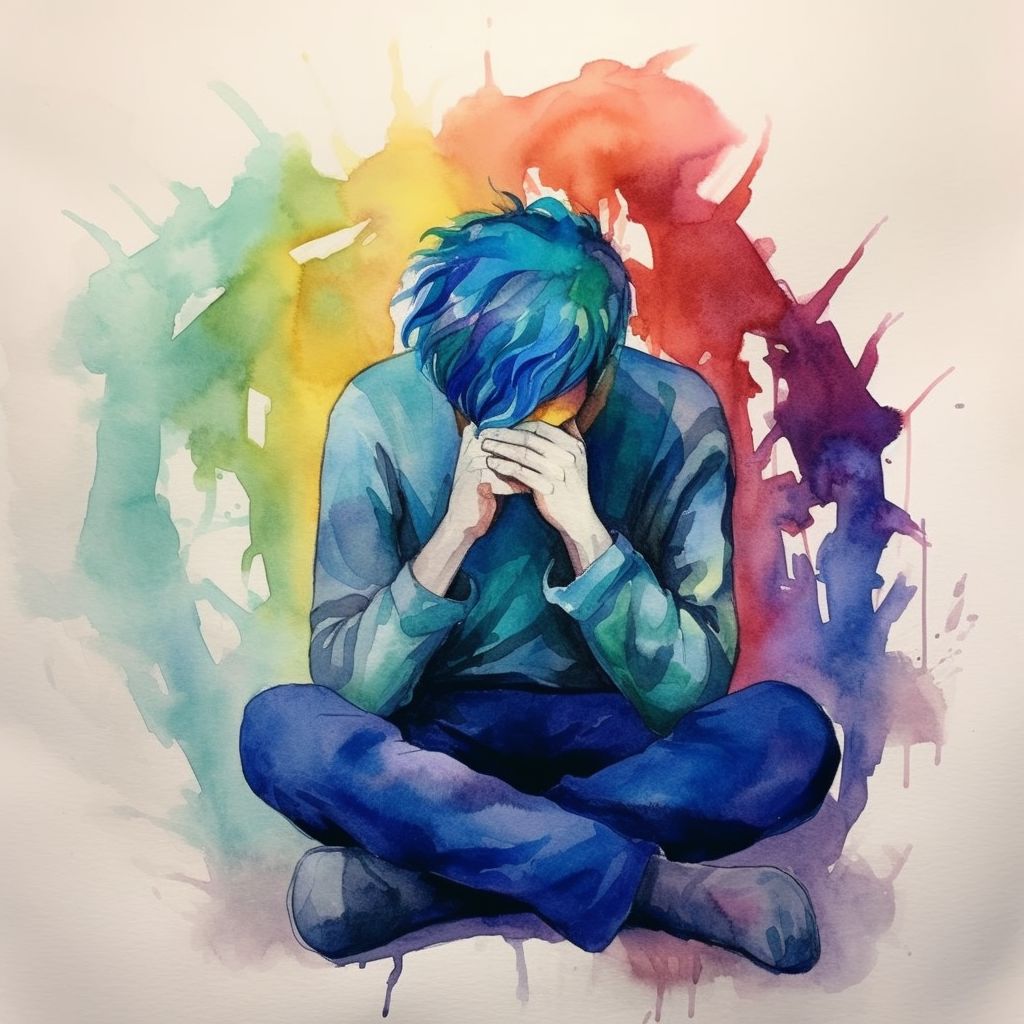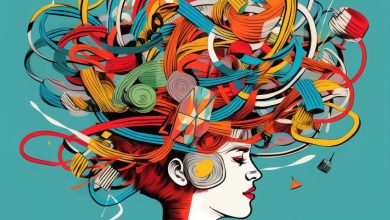INFJ Depression: Unraveling the Complex Mind

The INFJ personality type, as defined by the Myers-Briggs Type Indicator (MBTI), is a rare and intricate blend of traits. INFJs are known for their empathy, deep introspection, and creative intuition. They make up just around 1-3% of the population, making them one of the most unique personality types. Behind the empathetic facade, INFJs often grapple with a lesser-known challenge—depression. Research has shown that INFJs may be more prone to this mental health condition due to their heightened sensitivity and intense emotional world.
In this article, we will dive into the distinct dimensions of INFJ depression. We’ll uncover how their personality traits interact with this condition, examine its signs, and explore evidence-based coping strategies. Join us on this expedition to understand INFJ depression better and to discover ways to provide valuable support.
What is INFJ Personality?
According to the Myers-Briggs Type Indicator (MBTI), INFJ stands for Introverted, Intuitive, Feeling, and Judging. Let’s break that down:
- Introverted (I): INFJs often find energy in quiet introspection and solitude. They tend to be selective about their social interactions but deeply value meaningful connections.
- Intuitive (N): They rely on their intuition, seeking patterns and possibilities. This quality fuels their creativity and helps them envision solutions to complex problems.
- Feeling (F): Emotions take center stage for INFJs. They’re in touch with their own feelings and are profoundly empathetic, understanding and feeling the emotions of others.
- Judging (J): INFJs appreciate structure and prefer planned approaches to life. They are organized and driven by their values.

INFJs possess a unique blend of characteristics:
- Empathy: Their ability to empathize is unparalleled. They have a knack for understanding the emotions and needs of those around them.
- Deep Thinkers: INFJs are often lost in thought, contemplating the complexities of life and human nature. This introspection leads to profound insights.
- Creativity: Their intuitive nature fuels their creativity. INFJs are drawn to artistic pursuits and innovative problem-solving.
- Idealism: They have strong values and a vision of a better world. This idealism drives them to advocate for justice and meaningful change.
- Private: INFJs can be quite reserved, revealing their true selves to only a few close confidants.
While INFJs possess many strengths, they also face unique challenges:
Strengths
- Compassion: Their deep empathy allows them to provide unparalleled emotional support to others.
- Visionary Thinking: Their creative intuition can lead to groundbreaking ideas and solutions.
- Determination: Once committed to a cause, they exhibit unwavering dedication.
Potential Challenges
- Overthinking: The propensity for deep thought can sometimes lead to overanalysis and anxiety.
- Perfectionism: INFJs may set impossibly high standards for themselves, leading to self-criticism.
- Emotional Intensity: Their strong emotions can become overwhelming, especially in stressful situations.
Understanding these traits is crucial to comprehending how INFJs experience and manage depression, which we’ll explore further in this article.
Suggestion for INFJs: INFJ Mental Illness:
The Link Between INFJ Traits and Depression
One of the defining features of INFJs is their exceptional empathy. They have an innate ability to understand and feel the emotions of others, which can be both a blessing and a challenge. This heightened empathy often makes them susceptible to absorbing the emotions of those around them.

Research in the journal “Personality and Social Psychology Bulletin” has shown that INFJs tend to score high on empathy measures, making them more prone to emotional contagion.
INFJs are deep thinkers, constantly examining their thoughts and feelings. While this introspective nature can lead to profound insights, it can also contribute to self-doubt and overthinking, especially when faced with adversity or difficult decisions.
Studies like “Personality and Individual Differences” have explored the link between introspection and susceptibility to depressive thoughts, suggesting that constant self-analysis can be a risk factor for depression.
INFJs often set high standards for themselves and those around them. This drive for perfection can be a double-edged sword. While it propels them towards excellence, it can also lead to unrelenting self-criticism and, ultimately, contribute to depression.
“Psychological Bulletin” has published research indicating a strong correlation between perfectionism and depressive symptoms. INFJs’ innate perfectionism can thus play a role in their susceptibility to depression.
Understanding how these traits intersect with depression is vital in offering effective support and coping strategies, which we will explore further in this article.
| Suggestion: The Connection Between INFJ and ADHD
INFJ Depression Signs
Depression can manifest differently in INFJs, but some common signs and symptoms include:
- Persistent Sadness: INFJs may experience prolonged periods of profound sadness and hopelessness.
- Loss of Interest: Hobbies and activities that once brought joy may lose their appeal.
- Fatigue: They might feel perpetually tired, even after a full night’s sleep.
- Social isolation in depression: INFJs may withdraw from social interactions, seeking solitude to cope with their emotions.
- Overthinking: Their introspective nature can lead to excessive rumination on negative thoughts.
- Physical Symptoms: Depression can manifest physically, causing headaches, digestive issues, and muscle pain.
- Changes in Appetite: INFJs may either overeat or lose their appetite.
- Irritability: They might become more irritable or impatient with others.
- Difficulty Concentrating: Depression can impair cognitive functions, making it hard to focus or make decisions.
- Feelings of Guilt: INFJs may blame themselves for their depression, exacerbating feelings of worthlessness.
Understanding these signs and unique manifestations is crucial in offering support and helping INFJs navigate their journey through depression.
| Read more: Depression and Low Energy: Coping Strategies for Depression Fatigue
Causes and Triggers
Depression in INFJs can be influenced by a range of factors, including:
- Environmental Stressors: INFJs are highly sensitive to their surroundings. Environmental stressors such as a chaotic workplace or an unsupportive social environment can trigger or exacerbate their depression.
- Trauma: Past traumatic experiences, especially those involving betrayal or loss, can deeply affect INFJs and contribute to depressive episodes.
- Relationship Issues: Conflicts or strained relationships, which INFJs take to heart due to their empathetic nature, can be significant triggers of depression.

Studies like “The Role of Stressful Life Events in the Onset of Major Depression in Women” highlight the impact of stressors on depression, while research in the “Journal of Abnormal Psychology” discusses the connection between early-life trauma and depression.
INFJs are known for their deep thinking and contemplation of life’s big questions. This introspection can lead them to grapple with existential and philosophical concerns, which can be both a strength and a trigger for depression.
Research in the “Journal of Humanistic Psychology” has explored the relationship between philosophical pondering and depression, suggesting that excessive rumination on existential questions can contribute to depressive symptoms.
Understanding these triggers is essential in helping INFJs manage and prevent depression, as it allows for targeted support and coping strategies.
| Also might be interesting: INFJ Personality and Eating Disorders
Coping Strategies for INFJ Depression
Managing and mitigating depression in INFJs requires a multifaceted approach. Evidence-based strategies include:
- Cognitive Behavioral Therapy (CBT): CBT helps INFJs identify and challenge negative thought patterns, promoting healthier thinking and behavior.
- Mindfulness Meditation: Mindfulness practices, such as meditation and deep breathing, can help INFJs stay grounded and reduce the intensity of their emotional reactions.
- Social Support: Building a strong support network of friends and loved ones can provide emotional solace during challenging times.
- Regular Exercise: Physical activity releases endorphins, which can improve mood and reduce depressive symptoms.
Explore ‘INFJ Depression’ and Uncover Expert Insights in
‘Depression and Motivation: Coping Strategies for Lack of Motivation’
Your Path to Renewed Inspiration Begins Here!
Tailored Self-Care Tips for INFJs:
- Journaling: INFJs can benefit from journaling their thoughts and feelings as a way to process and gain insights into their emotions.
- Artistic Expression: Engaging in creative activities, such as writing, painting, or music, can be therapeutic and provide an outlet for emotions.
- Boundaries: Setting healthy boundaries in relationships helps protect INFJs from emotional exhaustion and overcommitment.
- Nature Connection: Spending time in nature can rejuvenate their spirits and provide a sense of calm.
These coping strategies, when personalized to an INFJ’s unique personality, can be highly effective in managing and mitigating depression.

Seeking Professional Help
It’s crucial to underscore the importance of seeking professional help when facing INFJ depression. While coping strategies and self-care can be valuable, depression can be a complex and serious condition that often requires professional intervention.
Beneficial Interventions for INFJs
- Therapy: Therapy, such as Cognitive Behavioral Therapy (CBT), can provide INFJs with a safe and supportive space to explore their thoughts and feelings. It equips them with coping skills and strategies to manage depression.
- Medication: In some cases, medication prescribed by a psychiatrist can help regulate mood and alleviate depressive symptoms. This is especially beneficial when depression is severe or long-lasting.
- Support Groups: Joining support groups, whether in-person or online, can connect INFJs with others who have experienced similar struggles, reducing feelings of isolation.
Professional help provides INFJs with expert guidance and tailored treatment plans, increasing their chances of recovery and long-term mental well-being.
| Suggestion: Top 10 Self-Care Practices for Depression
HealWiser’s Last Piece of Advice
Recognizing and addressing depression in INFJs is vital. Their empathetic nature often leads them to prioritize others’ well-being over their own, making self-awareness and support from loved ones crucial.
If you or someone you know is experiencing INFJ depression, seeking professional help is a critical step towards recovery. Remember, you’re not alone, and there are effective treatments available.
Sharing your experiences can provide valuable insights and emotional support. So…
…share your story with HealWiser and others in the comments section below this post.






